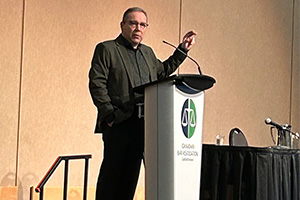
John Stack Memorial Lecture highlights ethical leader in the legal community
STM selects Dr. Gordon Martell, PhD as guest lecturer in 2025
By Jacquie BergFollowing John Stack’s unfortunate death in 1987 at just 50 years of age, the John Stack Memorial Lecture Fund was established through St. Thomas More College (STM) to honour his many contributions in the legal field especially in the areas of ethics and civic responsibility, in conjunction with his STM Board involvement and continued support for the College where he was once a student. Two of John’s children have also served in Board and legal counsel roles for the College, following in their father's footsteps.
In addition to STM’s role, the efforts and the contributions of many, especially John’s fellow lawyers, have made possible the continued funding and legacy of the John Stack Lecture.
Past guest speakers for the lecture have included Senator Brent Cotter, notable members of the Judiciary - including former Supreme Court of Canada Justice, Ian Binnie, and Federal Court of Appeal Justice Denis Pelletier, as well as by nationally known figures as former Assembly of First Nations National Chief Phil Fontaine.
This year St. Thomas More College (STM) nominated Dr. Gordon Martell, PhD to deliver the John Stack Memorial Lecture on Ethics and Civic Responsibility to the Canadian Bar Association, Saskatchewan Branch, at their mid-winter conference in Saskatoon on February 6, 2025.
Introduced by St. Thomas More College president Carl Still, Martell was recognized first in his educational role. A member of the Waterhen Lake Cree First Nation in Treaty Six Territory, Still noted Martell is currently an assistant professor in the Department of Educational Administration, College of Education at the University of Saskatchewan where he focuses on Indigenous educational leadership and governance.
Martell’s lecture for the event was titled Tipēyimisowin: Self-Determination, Community Consciousness, and Reconciliation where he spoke to the fact that First Nations peoples steward concepts of Treaty, such as the Cree language concept of Tipēyimisowin (independence; liberty, self-determination), are built out of our understanding of ethics and citizenship.
“Until we realize Treaty consciousness as an attribute of citizenship, our social contract is provisional. Tipēyimisowin is an expression of Treaty consciousness that predicts citizenship as a mediated conformity where we exercise our agency to enact our moral stance. As we build confidence in the right expressions of ourselves, we come into a renewed citizenship. By working together in the restoration of Indigenous worldviews, kinship models, and epistemologies, we imagine together new conceptualizations of our social democratic contexts that allows everyone to flourish,” said Martell.
Dr. Martell has served in a variety of leadership capacities for over 30 years in band-controlled and provincial education. A Superintendent of Education for 20 years, Martell also served on numerous provincial and federal committees including with Canada’s First Nations Elementary and Secondary Education Reform Expert Group; the Minister’s National Working Group on Education; and extensive educational governance, organizational, and leadership initiatives with First Nations communities and Tribal Authorities.
Recently, Martell has served in advocacy and advising roles for communities in the development of on-reserve First Nations education systems and chairing the Diocese of Saskatoon Indigenous Reconciliation Fund process.
President Still voiced appreciation for Martell’s service as a member of STM’s Advisory Circle on authentic Indigenization, supporting the College’s efforts to establish a Chair in Indigenous Spirituality and Reconciliation. Still said, “Gordon Martell’s work is an example of the praxis of reconciliation. He is showing us ways in which we can take up our civic responsibility to provide education that respects our treaty obligations to all young people.”
Martell has served this province greatly, with much deserved recognition including a Saskatchewan Centennial Leadership Award, City of Saskatoon Distinguished Community Service Award, the Queen Elizabeth II Platinum Jubilee Medal for his community service in healthcare, policing, philanthropy, and community development, which included having served as Board Director with St. Thomas More College, Royal University Hospital Foundation; United Way of Saskatoon; United Way of Canada; Saskatoon Trades and Skills Centre; Saskatoon Board of Police Commissioners; St. Paul’s Hospital; and the Saskatoon Urban Aboriginal Strategy.
Recognizing his commitment to education and his community, Dr. Martell was awarded the Guiding the Journey: Indigenous Educator Award from Indspire, an organization that invests in the education of First Nations, Inuit and Métis people. He was also the 2008 recipient of USask’s Alumni Excellence in Aboriginal Initiatives award.
